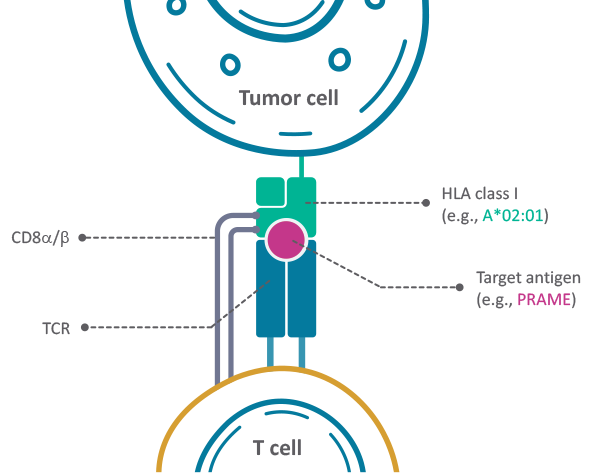Our Approach
Our Science
At TScan, we are focused on the development of T cell receptor (TCR)-engineered T cell (TCR-T) therapies.

TCR-T Cell Therapies
T cells, or T lymphocytes, are a type of white blood cell that plays a central role in the immune system. They are named “T cells” because they mature in the thymus gland, which is where they acquire their distinctive properties. T cells are a crucial component of the immune system and play a central role in the body’s defense against infections, cancer, and other diseases. They work in coordination with other immune cells and molecules to mount an effective immune response.
At TScan, we are focused on the development of T cell receptor (TCR)-engineered T cell (TCR-T) therapies. TCRs are located on the surface of T cells and recognize antigens, ultimately triggering T cell activation. Like CAR-T therapy, we are genetically reprogramming T cells to recognize and fight cancer cells. Instead of using antibody-based receptors, which are used in CAR-T therapy, we use naturally occurring TCRs. We are currently developing several TCR-T product candidates to treat both heme and solid tumor malignancies.
Heme Malignancies
TScan’s hematology program is designed to uniquely address patients who are diagnosed with acute myeloid leukemia (AML) or myelodysplastic syndromes (MDS) who are undergoing a standard of care, allogeneic bone marrow transplant (hematopoietic cell transplant or HCT) with reduced intensity conditioning. Unfortunately, ~ 4 in 10 patients will relapse following transplant, at which point there are limited treatment options and an 80% mortality rate over the next two years. TScan’s approach is to treat patients with engineered donor-derived TCR-T cells following allogeneic HCT to increase the opportunity for a cure. Learn more about our heme program here.
Solid Tumors
Solid tumors are notoriously heterogenous; not every cancer cell in a tumor expresses a given target antigen. Although targeting a single antigen can be successful for a small subset of patients, typically it results in a limited duration of response for those with heterogeneous tumors. Additionally, solid tumors can avoid immune attack by target or HLA loss, deterring T cells from recognizing and eliminating cancerous cells. TScan is looking to overcome previous shortcomings in the field by treating patients with up to three TCR-T therapies simultaneously, which we refer to as multiplex therapy. TScan is also enhancing its TCR-Ts to combat the hostile tumor microenvironment by co-delivering the CD8 co-receptor to engage helper T cells and a dominant negative form of TGFβRII to enhance T cell expansion and persistence. We believe this multi-pronged approach can improve outcomes for patients with solid tumors. Learn more about our solid tumor program here.

HLAs display target antigens for identification by cytotoxic T-cells
